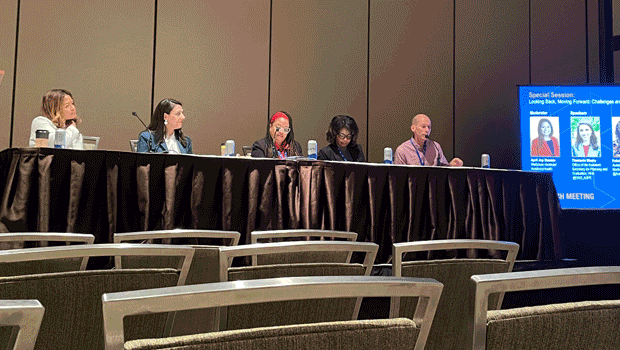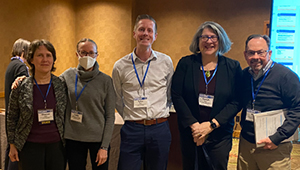KPWHRI research highlighted at AcademyHealth’s Annual Research Meeting

At the annual meeting, held in Seattle, several KPWHRI researchers shared recent study findings
Kaiser Permanente Washington Health Research Institute (KPWHRI) had strong participation at this year’s AcademyHealth Annual Research Meeting, which was held in Seattle. The meeting brings together stakeholders working in health research, health care, and policy to share ongoing work to improve health systems. The conference is also an opportunity to make connections with colleagues and funders and share ideas and learnings from past and current projects.
Co-design and collaboration
Collaborative research that engages patients, health care providers, and other partners to develop interventions or advise on changes to care was a major theme of the studies presented. The ENSPIRE Study (Engaging Staff to Improve COVID-19 Vaccination Response at Long-Term Care Communities), led by Clarissa Hsu, PhD, worked with long-term care center staff to co-design materials promoting COVID-19 boosters. Hsu shared how staff involved in the process provided positive feedback about the project and developed materials that they thought were relevant for their co-workers.
Kelsey Stefanik-Guizlo, MPH, shared results from the Integrated Pain Management program at KPWHRI’s Center for Accelerating Care Transformation (ACT Center), which partnered with patients experiencing persistent pain to design and deliver an intervention to provide whole-person care. Using an iterative process that centered patient partners as experts, they co-created 11 resources for health care teams and patients that were grounded in patient priorities.
Another ACT Center project, presented by Ammarah Mahmoud, MPH, followed up on a co-designed process to screen for social health needs, testing a pilot social health integration program that used 2 targeted care approaches for addressing the needs of patients. The researchers found that the pilot program appeared to address baseline needs, but that new needs could arise over time, suggesting that continuous engagement would be valuable.
To learn more about adolescent use of a digital patient portal, Annie Hoopes, MD, MPH, and her research team spoke with teens, parents, and clinicians about perceived benefits of the portal, as well as barriers and facilitators to using the portal. They concluded that future efforts should incorporate adolescent input into portal design and implementation.
Claire Allen, MPH, shared results from a survey on burnout and job satisfaction in care team members in 30 primary care clinics. Surveys were given to the same care teams at 3 different timepoints, yielding important data that can be used to reduce care team burnout and highlighting the importance of ongoing data gathering.
Cancer screening and follow-up
Several studies focused on cancer screening and treatment were featured at the conference.
The Larch Study, funded by the National Cancer Institute and led by Karen Wernli, PhD, presented 2 posters with key findings from the team’s work to improve adherence to lung cancer screening:
- Casey Luce, MPH, shared findings from the development of a patient-centered intervention co-designed with Kaiser Permanente Washington members. The team designed a video based on co-design workshops, which received positive feedback from patient advocates and is now being tested in a clinic setting.
- Kristine Rogers, MS, shared findings from developing electronic health record (EHR) tools for the study. The team identified 7 key steps for developing and using EHR interventions effectively, including advance planning around project goals and scope, and building the tools alongside users.
Karen Wernli also presented on barriers to follow-up during the screening process and how to measure screening quality in a pilot project funded by Alliance for Clinical Trials in Oncology.
Lorella Palazzo, PhD, shared the qualitative work she led exploring barriers and facilitators to identifying and caring for people at risk of hereditary breast and ovarian cancer. The team gathered data across 4 health systems and found that health care organizations could improve detection and care by increasing knowledge of hereditary cancers among providers and allocating greater resources to planning, staff, electronic systems, and data gathering.
Sharing knowledge and looking toward the future
KPWHRI researchers lent their expertise to multiple sessions oriented around knowledge-sharing and planning for the future. Paula Lozano, MD, MPH, moderated a special session on the next generation of learning health systems (LHSs), where the panel discussed how future LHSs need to evolve to address the need for better-quality, fairer, safer, and more effective health care. Jess Mogk, MPH, shared lessons learned from using virtual practice facilitation as the primary implementation strategy in the Integrated Pain Management program at the ACT Center, and discussed strategies the team used to overcome challenges with engaging primary care teams virtually.
Gregory Simon, MD, spoke on a panel addressing challenges and opportunities for the field of behavioral health. He shared perspectives on how the field has changed over the past 40 years, important considerations for designing and using models for suicide risk prediction, and findings from work at KPWHRI.
And Michael Parchman, PhD, participated in a workshop on the essentials of embedded pragmatic clinical trials, discussing challenges, solutions, and lessons learned from a current project. He shared lessons from a demonstration study conducted in 2 Accountable Care Organizations funded by the Imbedded Pragmatic Alzheimer’s Disease and AD-Related Dementias Clinical Trials (IMPACT) Collaboratory focused on deprescribing inappropriate medications for people living with dementia.
For more information on AcademyHealth and the Annual Research Meeting, visit academyhealth.org.
By Amelia Apfel
HCSRN conference

Researchers present, connect at annual conference
The HCSRN conference is a venue for collaborative work to improve health and health care.
News

Seattle welcomes AcademyHealth
In 2018, KPWHRI hosted the nation’s leading society for health services and policy research.


